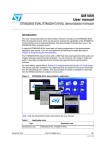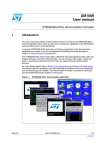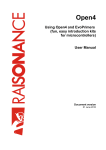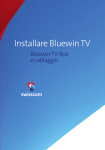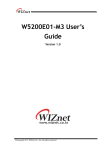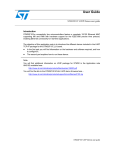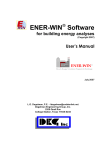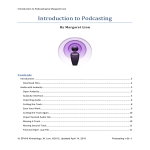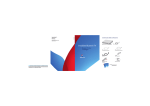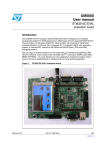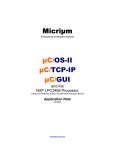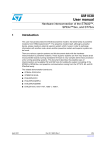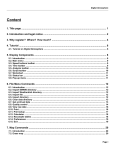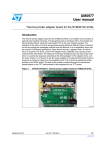Download STM3210C-EVAL demonstration firmware
Transcript
UM0713 User manual STM3210C-EVAL demonstration firmware Introduction This user manual describes the demonstration firmware running on the STM3210C-EVAL evaluation board, which can be used to evaluate the capabilities of connectivity line STM32F107xx microcontrollers and on-board peripherals. In case the STM3210C-EVAL board was not factory-programmed or the demonstration application was erased, you can reprogram it by following the steps described in Section 2.5. The STM3210C-EVAL board comes with a USB Flash disk preprogrammed with audio and image resources used by the demonstration. You can load your own image (*.bmp) and audio (*.wav) files providing that the file formats are supported by the demonstration. For more details please refer to Section 2.4.5: Audio player and Section 2.4.6: Image browser. The default audio file available in the USB Flash disk is based on a free music download from the DanoSongs.com website. This demonstration firmware is available for download from the STMicroelectronics website: http://www.st.com. Figure 1. June 2009 STM3210C-EVAL board with touch screen navigation Doc ID 15787 Rev 1 1/21 www.st.com Contents UM0713 Contents 1 Glossary . . . . . . . . . . . . . . . . . . . . . . . . . . . . . . . . . . . . . . . . . . . . . . . . . . . 5 2 Demonstration architecture overview . . . . . . . . . . . . . . . . . . . . . . . . . . . 6 2.1 Hardware resources . . . . . . . . . . . . . . . . . . . . . . . . . . . . . . . . . . . . . . . . . . 6 2.2 Hardware configuration . . . . . . . . . . . . . . . . . . . . . . . . . . . . . . . . . . . . . . . 7 2.2.1 Required accessories . . . . . . . . . . . . . . . . . . . . . . . . . . . . . . . . . . . . . . . 7 2.2.2 Jumper settings . . . . . . . . . . . . . . . . . . . . . . . . . . . . . . . . . . . . . . . . . . . . 7 2.3 Software resources . . . . . . . . . . . . . . . . . . . . . . . . . . . . . . . . . . . . . . . . . . 8 2.4 Demo description . . . . . . . . . . . . . . . . . . . . . . . . . . . . . . . . . . . . . . . . . . . . 9 2.5 2.4.1 Navigation procedure . . . . . . . . . . . . . . . . . . . . . . . . . . . . . . . . . . . . . . . . 9 2.4.2 Demo startup . . . . . . . . . . . . . . . . . . . . . . . . . . . . . . . . . . . . . . . . . . . . . . 9 2.4.3 USB console . . . . . . . . . . . . . . . . . . . . . . . . . . . . . . . . . . . . . . . . . . . . . 10 2.4.4 System info . . . . . . . . . . . . . . . . . . . . . . . . . . . . . . . . . . . . . . . . . . . . . . 11 2.4.5 Audio player . . . . . . . . . . . . . . . . . . . . . . . . . . . . . . . . . . . . . . . . . . . . . . 13 2.4.6 Image browser . . . . . . . . . . . . . . . . . . . . . . . . . . . . . . . . . . . . . . . . . . . . 14 2.4.7 Board game . . . . . . . . . . . . . . . . . . . . . . . . . . . . . . . . . . . . . . . . . . . . . . 15 2.4.8 Web server . . . . . . . . . . . . . . . . . . . . . . . . . . . . . . . . . . . . . . . . . . . . . . . 15 2.4.9 Clock security system . . . . . . . . . . . . . . . . . . . . . . . . . . . . . . . . . . . . . . 17 2.4.10 Power saving mode . . . . . . . . . . . . . . . . . . . . . . . . . . . . . . . . . . . . . . . . 17 2.4.11 Sub-demo interaction . . . . . . . . . . . . . . . . . . . . . . . . . . . . . . . . . . . . . . . 17 STM3210C-EVAL demonstration package . . . . . . . . . . . . . . . . . . . . . . . . 18 2.5.1 3 2/21 USB Flash disk directory organization . . . . . . . . . . . . . . . . . . . . . . . . . . 19 Revision history . . . . . . . . . . . . . . . . . . . . . . . . . . . . . . . . . . . . . . . . . . . 20 Doc ID 15787 Rev 1 UM0713 List of tables List of tables Table 1. Table 2. Table 3. Table 4. Acronyms and definitions . . . . . . . . . . . . . . . . . . . . . . . . . . . . . . . . . . . . . . . . . . . . . . . . . . . 5 STM3210C-EVAL jumpers . . . . . . . . . . . . . . . . . . . . . . . . . . . . . . . . . . . . . . . . . . . . . . . . . . 7 BMP formats supported . . . . . . . . . . . . . . . . . . . . . . . . . . . . . . . . . . . . . . . . . . . . . . . . . . . 14 Document revision history . . . . . . . . . . . . . . . . . . . . . . . . . . . . . . . . . . . . . . . . . . . . . . . . . 20 Doc ID 15787 Rev 1 3/21 List of figures UM0713 List of figures Figure 1. Figure 2. Figure 3. Figure 4. Figure 5. Figure 6. Figure 7. Figure 8. Figure 9. Figure 10. Figure 11. Figure 12. Figure 13. Figure 14. Figure 15. Figure 16. Figure 17. Figure 18. 4/21 STM3210C-EVAL board with touch screen navigation. . . . . . . . . . . . . . . . . . . . . . . . . . . . . 1 Hardware block diagram . . . . . . . . . . . . . . . . . . . . . . . . . . . . . . . . . . . . . . . . . . . . . . . . . . . . 6 STM3210C-EVAL hardware . . . . . . . . . . . . . . . . . . . . . . . . . . . . . . . . . . . . . . . . . . . . . . . . . 7 Software architecture . . . . . . . . . . . . . . . . . . . . . . . . . . . . . . . . . . . . . . . . . . . . . . . . . . . . . . 8 STM3210C-EVAL board with touch screen navigation. . . . . . . . . . . . . . . . . . . . . . . . . . . . . 9 Startup messages . . . . . . . . . . . . . . . . . . . . . . . . . . . . . . . . . . . . . . . . . . . . . . . . . . . . . . . . . 9 Main desktop . . . . . . . . . . . . . . . . . . . . . . . . . . . . . . . . . . . . . . . . . . . . . . . . . . . . . . . . . . . 10 USB console display . . . . . . . . . . . . . . . . . . . . . . . . . . . . . . . . . . . . . . . . . . . . . . . . . . . . . . 10 System info page 1: Hardware information. . . . . . . . . . . . . . . . . . . . . . . . . . . . . . . . . . . . . 11 System info page 2: CPU information. . . . . . . . . . . . . . . . . . . . . . . . . . . . . . . . . . . . . . . . . 11 System info page 3: Task Information . . . . . . . . . . . . . . . . . . . . . . . . . . . . . . . . . . . . . . . . 12 System info page 4: Miscellaneous Information . . . . . . . . . . . . . . . . . . . . . . . . . . . . . . . . . 12 Audio player controls . . . . . . . . . . . . . . . . . . . . . . . . . . . . . . . . . . . . . . . . . . . . . . . . . . . . . 13 Image browser example . . . . . . . . . . . . . . . . . . . . . . . . . . . . . . . . . . . . . . . . . . . . . . . . . . . 14 Game display . . . . . . . . . . . . . . . . . . . . . . . . . . . . . . . . . . . . . . . . . . . . . . . . . . . . . . . . . . . 15 Web server display . . . . . . . . . . . . . . . . . . . . . . . . . . . . . . . . . . . . . . . . . . . . . . . . . . . . . . . 15 Package directory tree . . . . . . . . . . . . . . . . . . . . . . . . . . . . . . . . . . . . . . . . . . . . . . . . . . . . 18 USB Flash disk directory tree . . . . . . . . . . . . . . . . . . . . . . . . . . . . . . . . . . . . . . . . . . . . . . . 19 Doc ID 15787 Rev 1 UM0713 1 Glossary Glossary Table 1. Acronyms and definitions GUI Graphical user interface USB Universal serial bus OTG USB on-the-go RTOS Real-time operating system Doc ID 15787 Rev 1 5/21 Demonstration architecture overview UM0713 2 Demonstration architecture overview 2.1 Hardware resources The demonstration firmware mainly uses the following two major peripherals which are major features of the STM32 Connectivity Line: ● Ethernet ● USB on-the-go The firmware makes use of other STM32 peripherals for demonstration purposes: ● User interface: color display, LEDs, event input (keys, touch screen) ● Media storage ● Audio (wav) player Some other STM32 hardware features are used globally by the demonstration application and the software environment (for example the SysTick timer for RTOS). Figure 2. Hardware block diagram LAN Host PC Ethernet USB USB OTG Display panel + touch screen SPI ARM Cortex-M3 core USB Flash disk GPIO Key and LEDs Buzzer + Headphones I2S STM32F107xx ai17132 6/21 Doc ID 15787 Rev 1 UM0713 2.2 Demonstration architecture overview Hardware configuration Figure 3. STM3210C-EVAL hardware Micro-AB connector LCD with touch screen support 2.2.1 Required accessories In addition to the STM3210C-EVAL board, the demonstration requires the following accessories: 2.2.2 ● USB Flash disk (provided with STM3210C-EVAL board package) ● Headphone with male jack connector ● Micro-AB to standard receptacle A connector (provided with STM3210C-EVAL board package) Jumper settings The following jumpers on the STM3210C-EVAL board should be configured shown in Table 2: Table 2. STM3210C-EVAL jumpers Jumper Usage Configuration JP2 Ethernet Not fitted JP3 Ethernet 2<->3 (MII) JP4 Ethernet 2<->3 (MCO) JP11-12-13 Ethernet 2<->3 JP14 Ethernet 1<->2 JP24 VBAT (RTC) 1<->2 JP10 I2S 1<->2 Doc ID 15787 Rev 1 7/21 Demonstration architecture overview Table 2. UM0713 STM3210C-EVAL jumpers (continued) Jumper 2.3 Usage Configuration JP17 I2C Fitted SW1 Boot 1<->2 SW2 Boot 1<->2 Software resources The demonstration is built with a modular architecture based on a real time operating system and uses a graphical windowing system based on the uC-OS-II RTOS from Micrium and the emWin graphical stack from Segger. The system configuration and the standard peripheral settings and configuration are made through the STM32F10x Standard Peripheral Library. Data used by the application are stored in the external USB Flash disk through a FAT file system (emFile from Segger) in order to save space in the STM32 internal Flash memory. Figure 4. Software architecture Application Ethernet stack RTOS (µC-OS II) Graphical stack file system USB host stack Core interface adaptation layer Ethernet driver OTG FS driver for USB on the go Standard peripheral drivers The demonstration application is built using the following software components: 8/21 1. STM32F10x Standard Peripheral Library V3.1.0 2. µC-OSII RTOS v 2.86 3. µC-USB Host stack v3.0 4. Graphical stack emWin V3.10. 5. File System emFile V4.16 from Segger 6. uIP TCP/IP stack v0.9 Doc ID 15787 Rev 1 UM0713 2.4 Demonstration architecture overview Demo description The STM3210C-EVAL demonstration is composed of five sub-demos and uses the eWIN graphical stack, uC-Host stack, the embedded touch screen is used as input device (one touch mode) and the LCD is used in 16-bit color mode. 2.4.1 Navigation procedure The STM3210C-EVAL demonstration is an interactive application; the navigation within subdemos is done by a single touch using a pen or by finger on the active touch screen. Figure 5. 2.4.2 STM3210C-EVAL board with touch screen navigation Demo startup The application starts in text mode till the initialization phase is completed. Figure 6. Startup messages STM3210C-EVAL demonstration Demo starting… LCD Initialization: OK Touch screen Initialization: OK GUI Initialization: OK Doc ID 15787 Rev 1 9/21 Demonstration architecture overview UM0713 After initializing the hardware, the USB host and the GUI stacks, the main desktop appears. Figure 7. 2.4.3 Main desktop USB console Figure 8. USB console display USB Console Manufacturer: STMicroelectronics Product: STM32 ROOT HUB Manufacturer: Kingston Product: Data Traveler G2 > USB Disk Flash Connected The USB console frame is always displayed to show the USB connectivity state: the message USB Disk Flash Connected means that the USB Flash disk is configured and ready to be used. 10/21 Doc ID 15787 Rev 1 UM0713 2.4.4 Demonstration architecture overview System info Figure 9. System info page 1: Hardware information X Hardware Information Board: STM3210C-Eval Device: STM32F107VC Firmware version: 1.0.0 CPU speed: 72 MHz STMicroelectronics (c) 2009 << >> Exit Figure 10. System info page 2: CPU information X CPU Usage (%) << >> Doc ID 15787 Rev 1 Exit 11/21 Demonstration architecture overview UM0713 Figure 11. System info page 3: Task Information Running Tasks X Stack size(B) Task ID Task nam e UC/OS-II Idle 21 0072 UC/OS-II Stat 20 0120 Start 06 0744 Input Event 08 0952 Gui Task 10 0960 << >> Exit Figure 12. System info page 4: Miscellaneous Information X Misc. Information Current Date: Tue. 23 June 2009 00:00:00 Dwn Up Sel Date/Time adjustment buttons << 12/21 >> Doc ID 15787 Rev 1 Exit UM0713 2.4.5 Demonstration architecture overview Audio player The audio player retrieves the wav files stored in the “Audio” directory in the connected USB Flash disk and plays them in a loop. The user can stop/play/resume/Go back/ forward and mute the audio sample. Note: The USB Flash disk should not be disconnected while the audio player application is running. Figure 13. Audio player controls Audio file name Elapsed / total time Status Audio Player Progress bar X file.wav......................PLAY...................................00:19 / 02:47 >|| |<< >> Mute Volume control Play/Pause Back Forward Stop Mute/ Sound off The Audio player supports all wav PCM audio files with the following configuration: ● Data length 8/16 bits ● Audio frequency: 8 to 96 kHz ● Channel number: Stereo/Mono Doc ID 15787 Rev 1 13/21 Demonstration architecture overview 2.4.6 UM0713 Image browser The Image browser retrieves the bitmap (BMP) files stored in the “Images” directory from the connected USB Flash disk and displays them. The Images browser automatically resizes the image to fit in the display area. Note: The USB Flash disk should not be disconnected while the Image browser application is running. Figure 14. Image browser example Image Browser (\Images\\file.bmp) |<< X >> Navigation buttons to scroll to next/first BMP file on disk The Image browser supports BMP file with formats as listed in Table 3. Table 3. 14/21 BMP formats supported bits per pixel Indexed Compression Supported 1 yes no yes 4 yes no yes 4 yes yes yes 8 yes no yes 8 yes yes yes 16 no no yes 24 no no yes 32 no no yes Doc ID 15787 Rev 1 UM0713 2.4.7 Demonstration architecture overview Board game The available game is a light version of the well-known Reversi game. Figure 15. Game display 2.4.8 Web server Figure 16. Web server display Web Server X IP address: 192.168.0.8 Status: Idle Total transferred data: 14548B This demonstration is an embedded Webserver based on uIP TCP/IP stack v0.9. It allows you to address the STM3210C-EVAL board as a web page using your web browser to control the four LEDs on the board. The STM32 Ethernet peripheral is configured in MII mode at 100 Mbps full duplex and the clock for the external PHY is provided by the STM32 through the MCO pin. Doc ID 15787 Rev 1 15/21 Demonstration architecture overview UM0713 How to use this demonstration: 16/21 ● Check that the jumper configuration on your STM3210C-EVAL board is correct, refer to Table 2.: STM3210C-EVAL jumpers ● Modify your PC network configuration – Disable the Internet firewall installed on your PC (if it is enabled) and bypass/deselect any proxy server in use. – Set your PC network card “Speed & Duplex” “to Auto Detect”, under Windows, select: Control Panel->Network Connections->Local Area Connection -> Properties->Configure->Advanced->Speed & Duplex – Change your PC IP address to 192.168.0.x (x different from 8): under Windows, select: Control Panel->Network Connections->Local Area Connection -> Properties->Internet Protocol (TCP/IP)->Properties->Use the following IP address ● Connect your PC to the STM3210C-EVAL board using an Ethernet crossover cable. ● Ping the board, by typing in the DOS command window: “ping 192.168.0.8” ● In your internet browser, type “http://192.168.0.8” to load the STM32 web page ● Now you can turn on/off the four LEDs on the STM3210C-EVAL board Doc ID 15787 Rev 1 UM0713 2.4.9 Demonstration architecture overview Clock security system At any demo level, if HSE clock fails (external 25 MHz crystal is broken or disconnected), a message is displayed to inform the user and the MCU enters Standby mode. To restart the demo, make sure that the external crystal is connected and then reset the board. 2.4.10 Power saving mode If the touch screen is not activated for a period of 30 s, the MCU enters the Stop mode and the LEDs stops blinking. To return to the run mode, press the key push-button and wait a few seconds for the end of the USB enumeration. 2.4.11 Sub-demo interaction Due to the intensive CPU use of some parts of the application, (GUI refresh and access to the USB Flash disk), some sub-demos cannot be run at same time. In order to reduce this interaction and reduce the time needed by the GUI to refresh the displayed windows, only the USB windows are allowed to run when the “Audio Player” is running this is classed as “exclusive” sub-demo, which means that the user cannot run the “Audio Player” and another sub-demo at same time. When the user attempts to launch an exclusive sub-demo, a message box is displayed to inform the user that an exclusive sub-demo is already running. Doc ID 15787 Rev 1 17/21 Demonstration architecture overview 2.5 UM0713 STM3210C-EVAL demonstration package The STM3210C-EVAL demonstration is supplied in one single zip file. The extraction of the zip file generates one folder, STM3210C-EVAL_FW, which contains the subfolders shown in Figure 17 and described below. Figure 17. Package directory tree ● Libraries: contains STM32F10xxx’s standard peripheral drivers (used for the IOExpander example) ● Project ● 18/21 – Demo: contains the binary image of the demonstration plus preconfigured projects for the EWARM and RVMDK toolchains, that can be used to program the binary image to the internal Flash memory. – IOExpander: contains example projects for the EWARM and RVMDK toolchains, that demonstrate how to configure and use the IO Expander and related modules (Joystick, Touch Screen for LCD, etc.) mounted on STM3210C-EVAL. Utilities – Binary: contains binary images of the demonstration to be used with the EWARM and RVMDK toolchains (provdied as backup). – STM3210C-EVAL: contains the LCD, IO Expander and other STM3210C-EVAL board-related drivers. Doc ID 15787 Rev 1 UM0713 Demonstration architecture overview To program the demonstration’s binary image into the internal Flash memory, you have to proceed as follows: ● ● 2.5.1 EWARMv5 – Open the Flash_Loader.eww project – Load the project image: Project->Download and Debug (CTRL+ D) – Restart the evaluation board (Press B1: reset button) RVMDK – Open the Flash_Loader.uv2 project – Load the project image: Debug->Start/Stop Debug Session – Restart the evaluation board (Press B1: reset button) USB Flash disk directory organization Figure 18. USB Flash disk directory tree The STM3210C-EVAL board comes with a USB Flash disk preprogrammed with Audio and Image resources used by the demonstration. However you can load your own image (*.bmp) and audio (*.wav) files in the “Images” and “Audio” directories, respectively, providing that these file formats are supported by the demonstration. For more details please refer to Section 2.4.5: Audio player and Section 2.4.6: Image browser. Doc ID 15787 Rev 1 19/21 Revision history 3 UM0713 Revision history Table 4. 20/21 Document revision history Date Revision 23-Jun-2009 1 Changes Initial release. Doc ID 15787 Rev 1 UM0713 Please Read Carefully: Information in this document is provided solely in connection with ST products. STMicroelectronics NV and its subsidiaries (“ST”) reserve the right to make changes, corrections, modifications or improvements, to this document, and the products and services described herein at any time, without notice. All ST products are sold pursuant to ST’s terms and conditions of sale. Purchasers are solely responsible for the choice, selection and use of the ST products and services described herein, and ST assumes no liability whatsoever relating to the choice, selection or use of the ST products and services described herein. No license, express or implied, by estoppel or otherwise, to any intellectual property rights is granted under this document. If any part of this document refers to any third party products or services it shall not be deemed a license grant by ST for the use of such third party products or services, or any intellectual property contained therein or considered as a warranty covering the use in any manner whatsoever of such third party products or services or any intellectual property contained therein. UNLESS OTHERWISE SET FORTH IN ST’S TERMS AND CONDITIONS OF SALE ST DISCLAIMS ANY EXPRESS OR IMPLIED WARRANTY WITH RESPECT TO THE USE AND/OR SALE OF ST PRODUCTS INCLUDING WITHOUT LIMITATION IMPLIED WARRANTIES OF MERCHANTABILITY, FITNESS FOR A PARTICULAR PURPOSE (AND THEIR EQUIVALENTS UNDER THE LAWS OF ANY JURISDICTION), OR INFRINGEMENT OF ANY PATENT, COPYRIGHT OR OTHER INTELLECTUAL PROPERTY RIGHT. UNLESS EXPRESSLY APPROVED IN WRITING BY AN AUTHORIZED ST REPRESENTATIVE, ST PRODUCTS ARE NOT RECOMMENDED, AUTHORIZED OR WARRANTED FOR USE IN MILITARY, AIR CRAFT, SPACE, LIFE SAVING, OR LIFE SUSTAINING APPLICATIONS, NOR IN PRODUCTS OR SYSTEMS WHERE FAILURE OR MALFUNCTION MAY RESULT IN PERSONAL INJURY, DEATH, OR SEVERE PROPERTY OR ENVIRONMENTAL DAMAGE. ST PRODUCTS WHICH ARE NOT SPECIFIED AS "AUTOMOTIVE GRADE" MAY ONLY BE USED IN AUTOMOTIVE APPLICATIONS AT USER’S OWN RISK. Resale of ST products with provisions different from the statements and/or technical features set forth in this document shall immediately void any warranty granted by ST for the ST product or service described herein and shall not create or extend in any manner whatsoever, any liability of ST. ST and the ST logo are trademarks or registered trademarks of ST in various countries. Information in this document supersedes and replaces all information previously supplied. The ST logo is a registered trademark of STMicroelectronics. All other names are the property of their respective owners. © 2009 STMicroelectronics - All rights reserved STMicroelectronics group of companies Australia - Belgium - Brazil - Canada - China - Czech Republic - Finland - France - Germany - Hong Kong - India - Israel - Italy - Japan Malaysia - Malta - Morocco - Philippines - Singapore - Spain - Sweden - Switzerland - United Kingdom - United States of America www.st.com Doc ID 15787 Rev 1 21/21





















